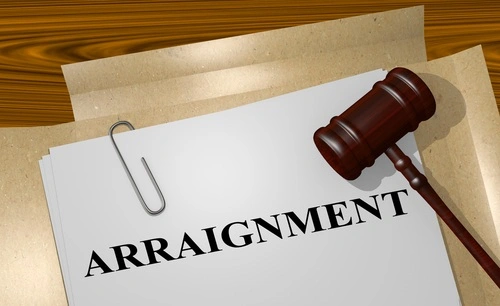When someone is arrested and charged with a crime, one of the first major steps in the criminal process is the arraignment. Many people fear this hearing, wondering, “Can I go to jail at my arraignment?” The short answer is yes, it’s possible—but not always likely. Whether a person is taken into custody at arraignment depends on several factors, including the seriousness of the charges, prior criminal history, and whether the court grants or denies bail.
Let’s break down what an arraignment is, what typically happens during it, and under what circumstances you might be taken to jail.

What Is an Arraignment?
An arraignment is a defendant’s first formal court appearance after being charged with a crime. It’s where the court informs the defendant of:
- 1. The exact charges filed against them,
- Their constitutional rights, and
- Their options for entering a plea (guilty, not guilty, or no contest).
If the defendant does not already have an attorney, the court may appoint one—especially in criminal cases where jail time is a potential penalty.
In most U.S. jurisdictions, arraignments occur within a few days after arrest. For misdemeanor charges, a person may receive a citation and be released before arraignment. For felony charges, the defendant is often held in custody until this hearing.
What Happens During the Hearing
At the arraignment, several key things occur:
- Reading of Charges: The judge formally reads the charges or provides the defendant with a copy.
- Entering a Plea: The defendant (or their lawyer) enters a plea. In most cases, defendants plead “not guilty” at this stage.
- Bail or Release Decision: Perhaps the most important part of the arraignment is when the judge decides whether to release the defendant pending trial—and under what conditions.
This is the moment where a defendant could be taken to jail or remain free.
When You Can Go to Jail at Arraignment
1. If You’re Already in Custody:
Defendants who are arrested and held in jail before arraignment may remain in custody if the judge denies bail or sets bail too high to pay.
2. If the Judge Denies Bail:
For serious offenses—such as violent felonies, sex crimes, or crimes involving major drug trafficking—a judge may decide that releasing the defendant poses too great a risk to public safety or flight. In those cases, the defendant will be remanded (kept in jail) until trial.
3. If You Violate Probation or Parole:
If the new charge occurs while you’re on probation or parole, the judge may revoke your release and order immediate detention.
4. If You Have Outstanding Warrants:
During arraignment, the court system may discover other pending cases or warrants. If so, the defendant can be taken into custody on those matters—even if bail is granted for the new charge.
5. If You Fail to Follow Court Orders:
Sometimes a judge will set release conditions—like avoiding contact with certain people, abstaining from alcohol, or surrendering firearms. Violating those terms, even at arraignment, can result in immediate jailing.
When You Usually Don’t Go to Jail
For first-time offenders, minor misdemeanors, or nonviolent charges, arraignments often end with release on bail or on a personal recognizance bond—meaning you promise to appear in court without paying upfront. Defendants represented by an attorney who demonstrates ties to the community, stable employment, or lack of prior record are also more likely to be released.
What You Should Do Before an Arraignment
If you have an upcoming arraignment, preparation can make a big difference:
- Hire an attorney early. Legal counsel can argue for your release and present evidence supporting bail.
- Appear on time and appropriately dressed. Showing respect for the court matters.
- Bring documentation. Proof of employment, residence, or community involvement can persuade the judge you’re not a flight risk.
The Bottom Line
Yes, you can go to jail at an arraignment—but it’s not guaranteed. The arraignment itself is not about proving guilt; it’s about informing you of the charges and determining your release conditions. For many, it’s simply the start of the legal process, not the end.
If you or someone you know faces an arraignment, speak with a qualified criminal defense attorney as soon as possible. The right legal guidance can mean the difference between walking out of court—and being taken into custody.

Our dedicated team gathers information from all the reliable sources to make the law accessible and understandable for everyone. We provide the latest legal news stories from across the country, delivered straight to you.
